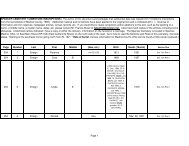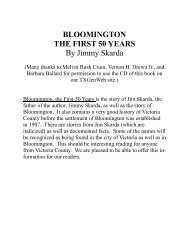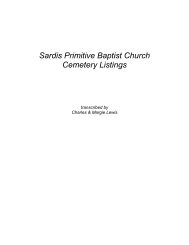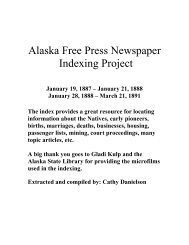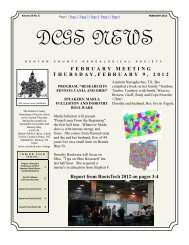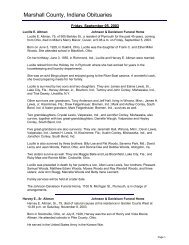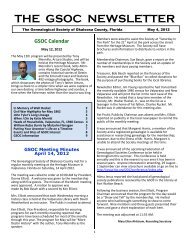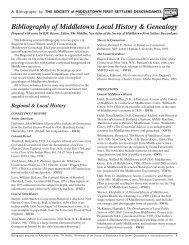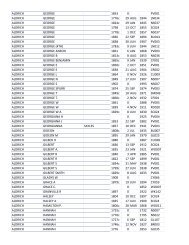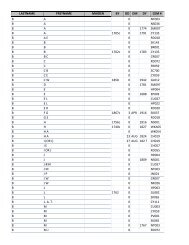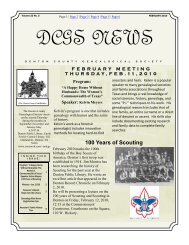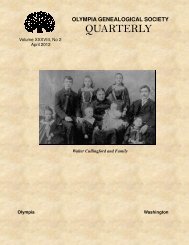Getting to the Roots of Your Family - RootsWeb - Ancestry.com
Getting to the Roots of Your Family - RootsWeb - Ancestry.com
Getting to the Roots of Your Family - RootsWeb - Ancestry.com
You also want an ePaper? Increase the reach of your titles
YUMPU automatically turns print PDFs into web optimized ePapers that Google loves.
Using German Church Records<br />
Baerbel K. Johnson, AG ®<br />
Johnsonbx@familysearch.org<br />
For research prior <strong>to</strong> 1875 church records are <strong>the</strong> primary source <strong>of</strong> family his<strong>to</strong>ry information in<br />
Germany. Sacramental records include baptisms, confirmations, marriages, and burials. Penance<br />
records, pew rent lists, soul registers, and family books may also be available. Church records usually<br />
provide <strong>the</strong> basis for <strong>com</strong>piled <strong>to</strong>wn genealogies known as Ortssippenbűcher or Ortsfamilienbűcher.<br />
EXACT LOCALITY NEEDED<br />
Parish registers are kept on <strong>the</strong> local parish level. Since very few regional and no national indexes<br />
exist, <strong>the</strong> <strong>to</strong>wn <strong>of</strong> origin must be known. Detailed suggestions for finding this information are found in<br />
<strong>the</strong> <strong>Family</strong>Search Wiki under https://wiki.familysearch.org/en/Tracing_Immigrant_Origins.<br />
RECORD AVAILABILITY<br />
The early church records begin in <strong>the</strong> 1500’s. Among <strong>the</strong> earliest Protestant parish registers from<br />
Germany are those from Baden dating back <strong>to</strong> 1531. The Catholics introduced parish registers later in<br />
1564. However, <strong>the</strong> 30-Year War resulted in great losses <strong>of</strong> early registers. Many <strong>of</strong> <strong>the</strong> Catholic parish<br />
registers are written in Latin.<br />
Not all <strong>to</strong>wns and villages have parishes and <strong>the</strong>refore will belong <strong>to</strong> <strong>the</strong> parish <strong>of</strong> a neighboring <strong>to</strong>wn.<br />
Meyers’ Gazetteer does not provide parish jurisdictions <strong>of</strong> localities that don’t have <strong>the</strong>ir own parish.<br />
Regional gazetteers and parish register inven<strong>to</strong>ries must be used <strong>to</strong> determine <strong>the</strong> name <strong>of</strong> <strong>the</strong> parish.<br />
RECORD FORMATS<br />
Registers <strong>of</strong> christening, marriages, and burials were usually kept separately. In many parts <strong>of</strong><br />
Germany, <strong>the</strong> death registers began later than <strong>the</strong> christening and marriage registers. However, in<br />
some parishes all <strong>the</strong> entries were <strong>com</strong>bined in one list. Church records may also include<br />
confirmations, lists <strong>of</strong> <strong>com</strong>municants, penance registers, soul registers and family books, lists <strong>of</strong> pas<strong>to</strong>rs<br />
and church <strong>of</strong>ficials, as well as pew lists and o<strong>the</strong>r financial records. Parish registers vary greatly as <strong>to</strong><br />
<strong>the</strong> amount <strong>of</strong> information provided. The record contents and format is greatly influenced by local laws<br />
and cus<strong>to</strong>ms.<br />
GEOGRAPHY AND LANGUAGE<br />
During its greatest expanse, <strong>the</strong> German Empire reached from its western borders with <strong>the</strong><br />
Ne<strong>the</strong>rlands, Belgium, Luxembourg, France, and Austria, <strong>to</strong> <strong>the</strong> Western parts <strong>of</strong> Russia. As a result <strong>of</strong><br />
<strong>the</strong> two World Wars, <strong>the</strong> area east <strong>of</strong> <strong>the</strong> Oder and Neisse rivers was lost <strong>to</strong> Poland, Russia, and<br />
Lithuania. In <strong>the</strong> West, a small section <strong>of</strong> <strong>the</strong> Rhineland called <strong>the</strong> Eupen-Malmedy region was annexed<br />
by Belgium, and Alsace-Lorraine became part <strong>of</strong> France. The area north <strong>of</strong> Flensburg in Schleswig-<br />
Holstein became part <strong>of</strong> Denmark.<br />
Depending on location and time period, <strong>the</strong> records may be kept in German, Latin, French, Polish,<br />
Russian, or o<strong>the</strong>r languages. Genealogical word lists for <strong>the</strong>se languages are also available on<br />
https://wiki.familysearch.org. Protestant registers are most <strong>of</strong>ten written in <strong>the</strong> local language, but may<br />
be written in Latin as well during <strong>the</strong> early years.



